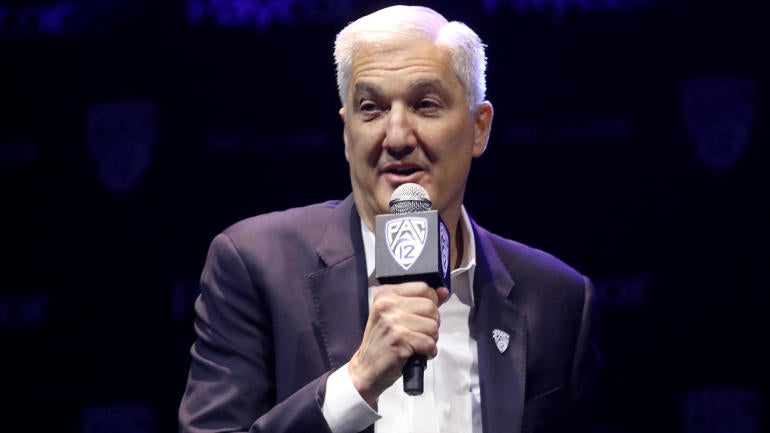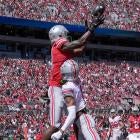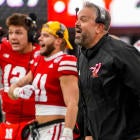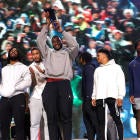
Pac-12 commissioner George Kliavkoff doubled down on his belief that the conference's upcoming media rights deal will "reward" the patience of his schools amid growing consternation in college athletics over the league's future. Opening up the Pac-12 Media Day event Friday in Las Vegas, the commissioner predicted an imminent conclusion to the latest cycle of conference realignment and downplayed concerns that league members could depart for the Big 12.
"Our schools are committed to each other and to the Pac-12," Kliavkoff said. "We'll get our media rights deal done, we'll announce the deal. I think the realignment that's going on in college athletics will come to an end for this cycle. The truth is we've got bigger fish to fry. There are incredible opportunities and also challenges in front of college athletics, and I need to be able to work with all of my colleagues in Division I and particularly in the A5, and we'll do that. We'll move past all the bitter squabbling of the last year, and we'll work together to make college athletics better."
The Big Ten and SEC are signed to lucrative media rights deals for the next decade. The Big 12 inked a new six-year rights agreement with ESPN and Fox that will begin in 2025. The ACC is under contract with ESPN through 2035-36. Meanwhile, the Pac-12's current deal expires in 2025 and the league has been working for over a year to find a new contract that will keep it on par with the other Power Five conferences.
"Getting the right deal has always been more important to our board and the conference has always been more important to our board and to the conference than getting the expeditious one," Kliavkoff said.
With UCLA and USC departing for the Big Ten after the 2023-24 athletic year, the league is not only losing two of its marquee brands but also its foothold in the massive Los Angeles television market. Kliavkoff, however, tried to offer reassurance about the media landscape.
"I will tell you what we've seen is that the longer we wait for our media deal, the better our options get," he said. "I think our board realizes that. There's an underlying shift in the media market that's happening. We're long-term taking advantage of that. But short term, it may have provided some hiccups."
The final value of the television contract should play a significant role in whether schools such as Arizona, Arizona State, Utah and Colorado are content to stay in the Pac-12 over the long haul. With or without more departures, Pac-12 expansion appears to remain on the table even as San Diego State -- a long-rumored target for the conference -- and the Mountain West are poised to remain together.
"Regarding potential expansion, while we have already done the due diligence on expansion candidates many months ago and significantly narrowed our focus to a handful of schools, our sequence remains unchanged," Kliavkoff said. "First, we will conclude our media rights deals, then our schools will sign our Grant of Rights, which has already been negotiated, and only then will we decide on potential expansion."
Kliavkoff clarified that affiliation with the prestigious Association of American Universities is merely "a part" of the criteria the league considers for expansion candidates and not necessarily a firm requirement. Though realignment and media rights were hot-button topics of the day, Kliavkoff also sought to look beyond those issues by addressing some of the larger problems facing college sports.
Amid the chaos of federal intervention with the regulation of name, image and likeness rules, Kliavkoff pegged the "employee status" of athletes as a "bigger and existential threat" to college athletics than the uncertainty around NIL.
"Are student-athletes deemed to be employees if they are unionized and collectively bargained?" he said. "We end up in a place where I don't think most of our schools or schools around the country will be able to support our olympic sports, our women's sports. I think that money dries up. I think we have work to do there."





















